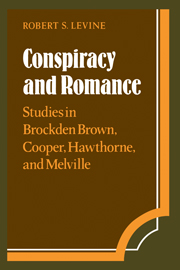Summary
Thoughtful men see perils on the horizon.
Josiah Strong, Our CountryIn the late 1870s Henry James reflected on Hawthorne's response to the Civil War. Hawthorne was “horrified and depressed,” James reported, because the war “cut from beneath his feet the familiar ground which had long felt so firm, substituting a heaving and quaking medium in which his spirit found no rest.” It was therefore not so surprising, James concluded, that during such a time the antebellum provincial should have failed to complete a new romance. And yet, as I have argued, the conspiratorial fears of the early national and antebellum period expressed not only Hawthorne's but also many Americans' concerns that they were living in a “heaving and quaking” time in which the familiar could instantly become unfamiliar. To a considerable degree, these fears and their accompanying discourses helped to give form and substance to the American romance. One large effect of the Civil War, as Melville came to realize, was to firm up the nation's ground and put romance to rest.
Despite an economic panic and sporadic clashes between management and labor, the late 1860s and 1870s may have been the most stable and assured period in the nation's history. As David Brion Davis remarks, “Insofar as the Slave Power had become a symbol of universal evil which could be blamed for most of America's frustrations and shortcomings, the South's decisive defeat gave the appearance of purging the nation of all dangerous subversion and opening a new era of self-confident freedom.” Yet social conflict and conspiratorial fears did, of course, persist.
- Type
- Chapter
- Information
- Conspiracy and RomanceStudies in Brockden Brown, Cooper, Hawthorne, and Melville, pp. 231 - 233Publisher: Cambridge University PressPrint publication year: 1989



